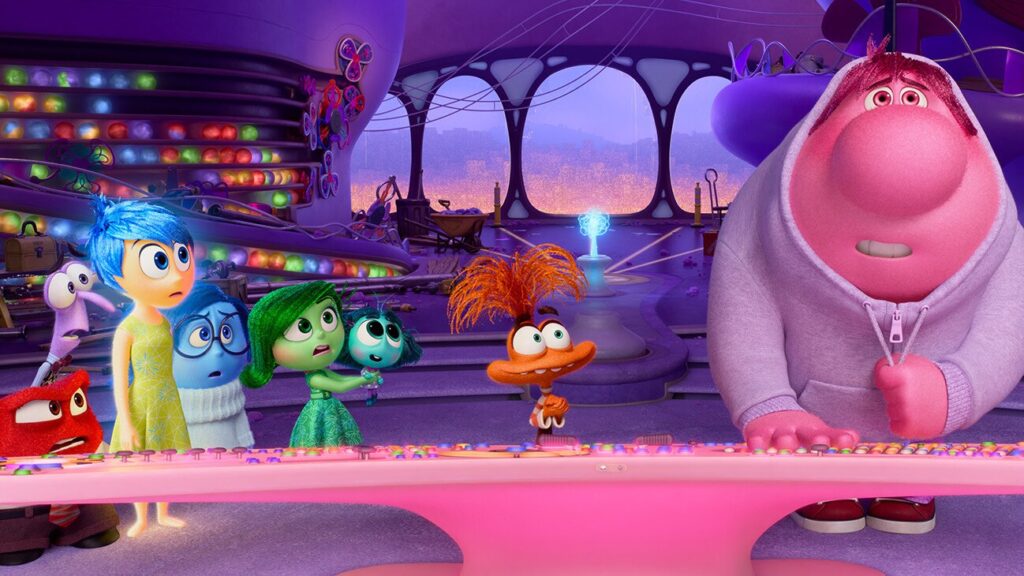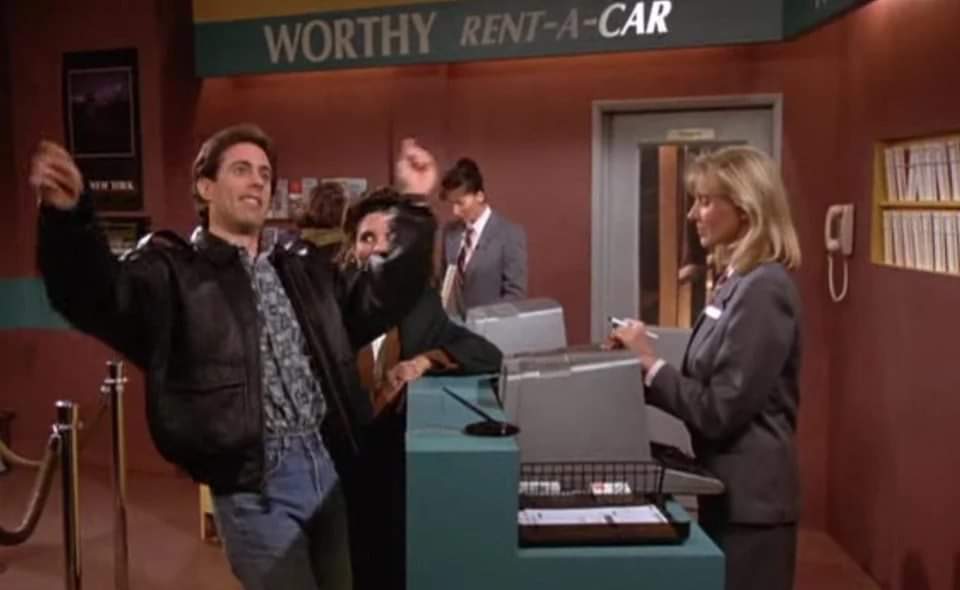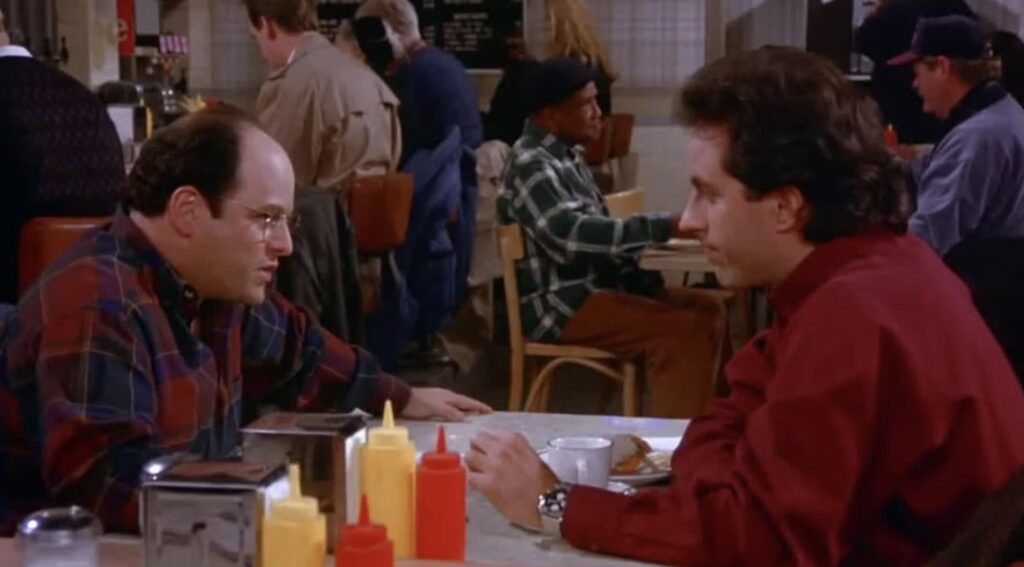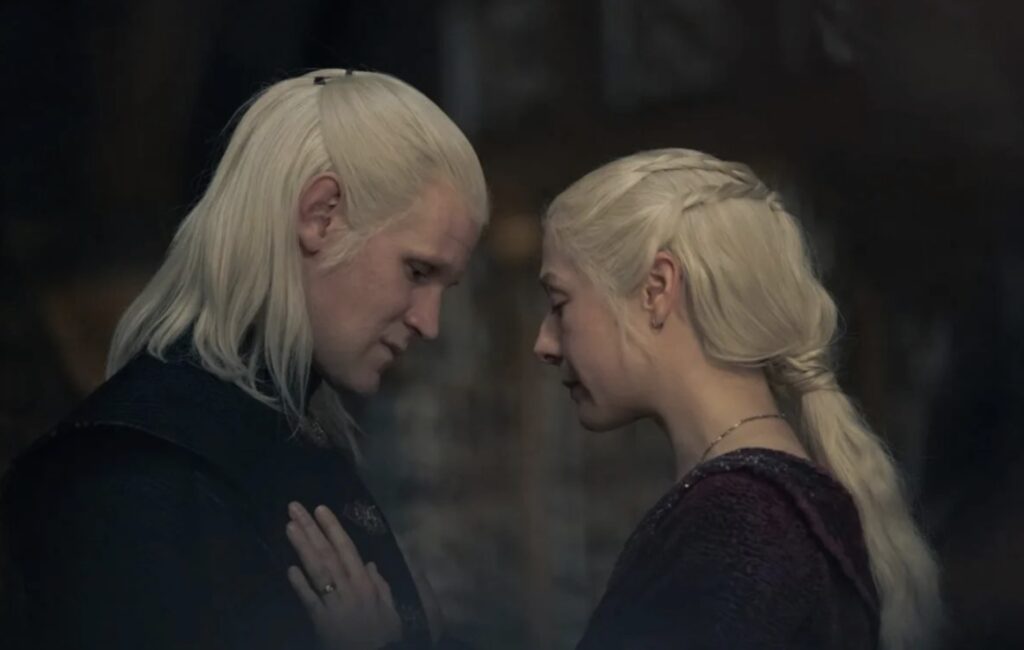From Seinfeld to Inside Out to A Quiet Place to House of the Dragon, this may be the most mishmashy of Mish-Mash Mondays ever!

Because I watch Seinfeld so much, Youtube always recommends Seinfeld-related content to me.
Yesterday, it recommended me this couple, who had never seen Seinfeld before, watching a video compilation of “all the best Seinfeld moments.” The first scene in the compilation is a famous scene from an early season where Jerry and Elaine pick up a car from a car rental company.
In it, the car rental attendant tells Jerry that the car he reserved isn’t available. The next series of jokes is Jerry pointing out that the whole point of a reservation is that the car remains reserved. “Anybody can just TAKE reservations,” Jerry says.

The couple watching this clip laughed quite a bit because it’s a relatable situation that we all have been through in some form or another.
But then an interesting thing happened. As more “Best Of” Seinfeld scenes continued to play, many from the later seasons, the couple was laughing less and less.
There’s one scene where Jerry and Kramer switch apartments for reasons too elaborate to summarize here, and Jerry starts becoming Kramer (wild and untethered) while Kramer starts becoming Jerry (calm and sarcastic). The scene plays out with Jerry stumbling into “Kramer’s” apartment telling a wild story about what happened to him after staying up all night.

The couple didn’t laugh at all in this scene. Nor did they laugh at the next scene where Jerry and George are trying to figure out how to pull off the hardest move in the male-female relationship dynamic – the roommate switch. One of my all-time favorite episodes by the way.
It was at this point that I realized just how well these new scenes were written and how poorly that first car reservation scene was written.
You’re probably thinking, “Wait, Carson. You got that mixed up. You mean how good the CAR RESERVATION scene was and how weak the OTHER scenes were.” No, you heard me correctly. How good THESE NEW SCENES were. And I know I’m right SPECIFICALLY BECAUSE the couple wasn’t laughing at them.
You see, with good writing, the plot and the characters are so intertwined that if you just dropped into the show (or the movie) and watched whatever scene was next, you wouldn’t be able to enjoy it. At least to the extent that it was meant to be enjoyed.

Because the writers have been carefully setting that scene up through all the other scenes written before it. The scene with Jerry and George pulling off the roommate switch was prefaced by ten scenes setting up the fact that Jerry was going out with a really lame girl who never laughed at his jokes and who he didn’t have any fun with. One day he dropped her off at her apartment and met her roommate and her roommate was the opposite. She was fun and laughed at everything he said. She was his ideal woman. But it didn’t matter because she was his girlfriend’s roommate and, therefore, there was no way for them to be together.
It’s only when you’ve seen Jerry and the girlfriend together a few times and experience their lame dynamic then see how electric it is between Jerry and the other girl that you fully understand this scene where Jerry sits George down to try and figure out if the impossible – the “Roommate Switch” – can be done.
Now, if we go back to that first scene, with the car reservation – that scene was reflective of early Seinfeld episodes, where they would write individual self-contained scenarios that had little-to-no setup. It’s like the writers said, “What’s funny? Oh yeah, when you go to the car reservation place and they don’t keep your reservation.” Then they would write that scene regardless of whatever the plot was.
There was no connective tissue. They just found funny situations and would ram them into wherever there was a hole in the script.
That’s not to say that scene can’t be good or that the car reservation scene wasn’t funny. I was exaggerating when I said it was weak. But a truly good scene rarely works unless you’ve watched everything before it. Because an essential component of good writing is using each scene to build that which you will pay off later.
This is not just true for comedy. It’s true for everything. If you showed your favorite scenes to people who have never seen the movies before, there’s a good chance they won’t think the scene is nearly as amazing as you do. That’s because they don’t have the context you do.
The operative lesson here is, every scene you write should only fully work for those who have watched everything up to that point. If the scene works all by itself, it doesn’t mean the scene is bad. But it definitely could’ve been a lot better.
You know what doesn’t have to be a lot better?
Inside Out.
This is one of those box office anomalies they’ll talk about for centuries to come. Nobody could crack the 100 million dollar mark for six months at the box office, and in just two weeks, one movie has pulled in 350 million. And three-quarters of a billion worldwide!
Usually, any box office assessment is silly Monday Morning quarterbacking. Everybody’s guessing at why *this* did well or *that* did badly. It’s fun but not relevant.
However, when a movie outperforms the market this much, a market that’s flailing, you have to take notice. You have to ask why. I know this itches people the wrong way but the lack of any message-pushing is partly why it’s doing well. The fact that it’s animated means it has the biggest potential audience to pull from. It isn’t like an R-rated flick where you only have access to 60% of moviegoers.
Also, shout out to screenwriting. The first Inside Out had an amazing screenplay. The world-building alone should be taught in film school. I still think it should’ve won the Oscar. That definitely played a part in people eagerly coming back for more.
But outside of that, I don’t know why it’s doing so well. It’s not like it had Nemo or Elsa or Simba or Woody. I doubt anyone even remembers what the main character’s name is. So it’s a bit of a mystery. There’s some people who are going with the old air conditioner theory. It was scorching hot all weekend and everyone wanted air conditioning for two hours.
I don’t know. I *will* watch it when it hits streaming. But it won’t be a theater movie for me.
By the way, this weekend is going to be nuts for content. The 27th is when The Bear Season 3 comes out. Netflix releases Beverly Hills Cop 4 the next day. And A Quiet Place comes out with its second sequel.
And here’s something to keep your eye on. That movie IS NOT being shown to critics. That is a GIANT red flag. I was worried about this movie THE SECOND I read that Death of Robin Hood script. That script was AWFUL. And when I realized that he was the one doing Day One, all my excitement was murdered. Cause those trailers were sooooo good. But, hey, I’m still hoping for the best. And it’s always nice to go into a movie with zero critical analysis clouding your judgment.
Okay, on to House of the Dragon.

To give you some context here, I used to get a lot of e-mails asking me why I never reviewed Game of Thrones episodes. Which was because I stopped watching the show in Season 5. I remember watching 4 episodes in a row where nothing happened. So I was frustrated. It wasn’t that I actively stopped watching it. I just never got back to it.
So I wanted to be on top of things this time around. I wanted to be there at the ground level. However, I’m starting to read some House of the Dragon backlash online. The ratings, supposedly, aren’t that high. I don’t know if I believe that, though. People literally watch stuff 20 different ways these days. There’s no chance they’re able to track views across all platforms/media.
What I’m looking for in episode 2 is some actual CRAFT to the storytelling. It can’t just be exposition exposition exposition exposition SHOCK at the end, like last week. Let’s find out what happened!
From a writing perspective, this episode is interesting. Because it’s dealing with a sort-of problem. When you kill off an important character, it is necessary that you commit to the ramifications of that story choice.
In other words, you can’t just jump forward and not mention anybody’s reaction to the child’s death, so that you can get to more exciting story threads.
The problem is, even though the character was technically important, it’s not a character we knew. It’s a baby. So it’s not like WE THE AUDIENCE need to grieve. Therefore, we would’ve been fine with moving on.
But since it doesn’t make sense for the characters to move on, the writers must commit to that choice. They must show us the funeral. They must sit in the sadness and the anger inherent in the multitude of characters close to the child.
To do this as a writer, you have to make a bargain with the audience. If you’re going to make them suffer through this, you have to give them some meat. And the best place to find writing meat is in the future. So, one of the first things we hear from the Hand of the King is: “Don’t worry, we’re going to go to war soon. But first we have to make some strategic moves to get a few more people on our side.”
This is the whole kit and caboodle with screenwriting. You have to promise the reader that, if they keep reading, they’ll be rewarded. “Cool shit is coming” is the gangster way of saying it. So we’ll suffer through eating soup for a few nights as long as we know we’re getting a five course meal (the war) at the end of the week.
But that doesn’t mean you can only focus on the sadness. We do get our share of sad scenes in the aftermath of this brutal assassination. But we need cool scenes. Scenes that grab us. And, in TV writing, the bread-and-butter way you do that is you put two people in a scene and ramp up the conflict.
So, the two big scenes in this episode are 1) When Rhaenyra confronts Daemon about initiating this assassination, which is going to weaken their support in the war. And 2) When the young King Aegon confronts the Hand of the King, Otto Hightower, about his crappy advice and forces him to give up his position.
The second scene stood out, in particular, because there was actually a consequence at the end of the scene. TV suffers from a lot of scenes where conflict happens but we’re at the same place at the end of the scene as we were at the beginning. So even though we got some drama, the scene ultimately feels unimportant. This scene actually ended in something happening so it became one of the best scenes in the episode.
The best scene of the episode, though, is at the end when the bad twin infiltrates the Queen’s quarters and tries to kill her. Remember that no amount of dialogue conflict will ever beat a character actually TAKING ACTION. When you have characters taking action, they are going to create SOMETHING. So it’s always a good idea to keep your characters active as opposed to waiting for the next conversation.
I do think that House of the Dragon is well-written. I don’t like some of these scenes, such as rando King Number 7 laying in bed with his wife mumbling about who knows what. But that’s one of the challenges of writing a show like this. You need to keep those characters in the mix so we don’t forget about them and, sometimes, you don’t have anything for them to do, so you just give us a weak reminder scene. But it’s definitely one of the better-written shows out right now. What’s better?

